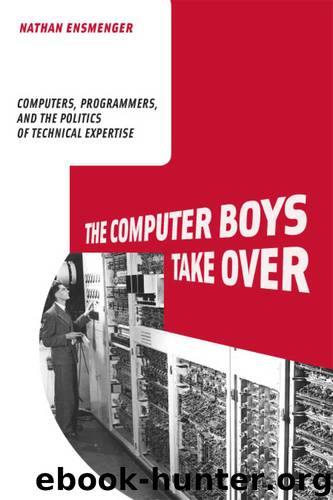The Computer Boys Take Over by Nathan L Ensmenger

Author:Nathan L Ensmenger [Ensmenger, Nathan L.]
Language: eng
Format: epub
ISBN: [ER ISBN NO DASHES]
Publisher: MIT Press
Published: 2010-10-08T04:00:00+00:00
7
The Professionalization of Programming
In the development of professional standards, the computer field must be unrelenting in advocating stringent requirements for professional status, whether these include education, experience, examination, character tests, or what not.
—Charles M. Sidlo, “The Making of a Profession,” 1961
Too frequently these people [programmers], while exhibiting excellent technical skills, are non-professional in every other aspect of their work.
—Malcolm Gotterer, “The Impact of Professionalization Efforts on the Computer Manager,” 1971
The Certified Public Programmer
In 1962, the editors of the electronic data processing journal Datamation proposed what they believed would be the solution to the “many problems” that were “embarrassingly prominent” in the nascent commercial computing industry. The majority of these problems, they argued, were caused by the lack of “professional competency” among programming personnel. The recent explosive growth in commercial computing had brought with it a “mounting tide of inexperienced programmers, new-born consultants, and the untutored outer circle of controllers and accountants all assuming greater technical responsibility.” Few of these so-called computer experts were well qualified or experienced, and the result was the crisis of confidence that was plaguing the industry. The solution to this crisis, contended the Datamation editors, was the establishment of a new breed of technical professional: the certified public programmer.1
By defining clear standards of professional competency, an industry-wide certification program would serve several important purposes for the programming profession. First, it would establish a shared body of abstract occupational knowledge—a “hard core of mutual understanding”—common across the entire professional community. Second, it would help elevate the public reputation of computer personnel from its current stature of “cautious bewilderment and misinterpretation,” to “at least, confused respect.” Finally, and perhaps most significantly, it would enable computer professionals to erect entry barriers to their increasingly contested occupational territory: the flood of amateur programmers—“the industry’s widely publicized upcoming incompetents”as the Datamation editorial dismissively referred to them—“would find their accession to financial stardom impeded by the need for specific qualification such as the passing of a reasonable test of competency.”2 In fact, in 1963 the DPMA’s executive director Calvin Elliott named stamping out “bogus” data-processing schools as one of his organization’s primary objectives.3
The Datamation call for the professionalization of programming coincided neatly with the announcement by the National Machine Accountants Association (NMAA) of its new CDP examination. The NMAA, which would later that year rename itself the Data Processing Management Association (DPMA), represented almost sixteen thousand data processing workers in the United States and Canada.4 The NMAA had been working since 1960 to develop the CDP exam, which represented the first attempt by a professional association to establish rigorous standards of professional accomplishment in the data processing field. According to the NMAA’s 1962 press release, the exam was intended to “emphasize a broad educational background as well as knowledge of the field of data processing,” and represent “a standard of knowledge for organizing, analyzing and solving problems for which data processing equipment is especially suitable.” It was open to anyone, NMAA member or
Download
This site does not store any files on its server. We only index and link to content provided by other sites. Please contact the content providers to delete copyright contents if any and email us, we'll remove relevant links or contents immediately.
Mastering Bitcoin: Programming the Open Blockchain by Andreas M. Antonopoulos(3029)
Dawn of the New Everything by Jaron Lanier(2760)
Blockchain: Ultimate Step By Step Guide To Understanding Blockchain Technology, Bitcoin Creation, and the future of Money (Novice to Expert) by Keizer Söze(2471)
Alibaba by Duncan Clark(2070)
Foundations of Blockchain by Koshik Raj(1975)
Owning Bitcoin: The Illustrated Guide to Security, Privacy, and Potential by Apodaca Richard(1957)
Significant Zero by Walt Williams(1954)
The Mastermind by Evan Ratliff(1925)
Mastering Blockchain by Imran Bashir(1858)
Bitcoin: The Basics of Blockchain and Investing in Cryptocurrency by K. Connors(1798)
Bitcoin: The Ultimate Guide to the World of Bitcoin, Bitcoin Mining, Bitcoin Investing, Blockchain Technology, Cryptocurrency (2nd Edition) by Ikuya Takashima(1684)
Attack of the 50 Foot Blockchain by David Gerard(1667)
Turing's Cathedral by George Dyson(1660)
The Bitcoin Standard: The Decentralized Alternative to Central Banking by Saifedean Ammous(1649)
Cryptocurrency by Neil Hoffman(1634)
Shaping the Fourth Industrial Revolution by Klaus Schwab & Nicholas Davis & Satya Nadella(1614)
The Bitcoin Guidebook by Ian DeMartino(1606)
Dawn of the New Everything: Encounters with Reality and Virtual Reality by Jaron Lanier(1605)
Bill Gates by Michael Becraft(1554)
